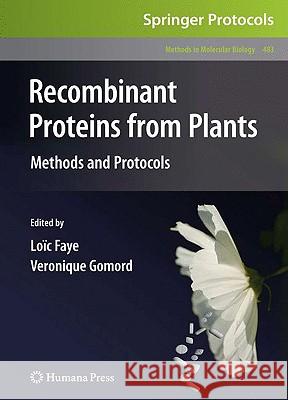Recombinant Proteins from Plants: Methods and Protocols » książka
Recombinant Proteins from Plants: Methods and Protocols
ISBN-13: 9781588299789 / Angielski / Twarda / 2008 / 358 str.
Altogether, the biochemical, technical and economic limitations on existing proka- otic and eukaryotic expression systems and the growing clinical demand for complex therapeutic proteins have created substantial interest in developing new expression systems for the production of therapeutic proteins. To that end, plants have emerged in the past decade as a suitable alternative to the current production systems, and today their potential for production of high quality, much safer and biologically active complex recombinant pharmaceutical proteins is largely documented. The chapters in this volume, contributed by leaders in the field, sum up the state-- the-art methods for using a variety of different plants as expression hosts for phar- ceutical proteins. Several production platforms are presented, ranging from seed- and leaf-based production in stable transgenic plant lines, to plant cell bioreactors, to viral or Agrobacterium-mediated transient expr ession systems. Currently, antibodies and their derived fragments represent the largest and most important group of biote- nological products in clinical trials. This explains why the potential of most prod- tion platforms is illustrated here principally for antibodies or antibody fragments with acknowledged potential for immunotherapy in humans. In addition, a comparison of different plant expression systems is presented using aprotinin, a commercial phar- ceutical protein, as a test system. Although multiple books and monographs have been recently published on mol- ular pharming, there is a noticeable dearth of bench step-by-step protocols that can be used quickly and easily by beginners entering this new field.











